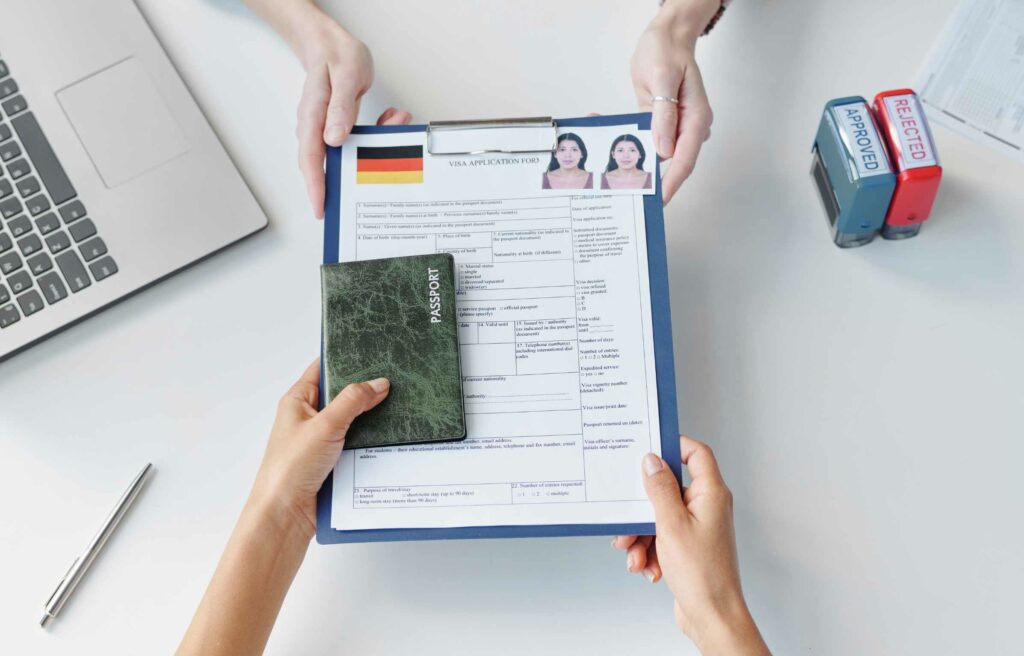Dual citizenship in Germany allows one to be part of one of the most influential countries in Europe, with 83 million people steeped in history and tradition. Highly modern architecture, dynamic infrastructure, and innovation stand out. Having opened the doors toward the core of the European Union, Germany highlights successful business opportunities and a stable and secure economy.
Germany, Europe’s largest economy, excels in automotive, engineering, and technology. With a $4.5 trillion GDP, it’s home to giants like Volkswagen and BMW. Tourism generates €287 billion annually from 39 million visitors.
So, you can learn how to obtain dual citizenship below without delay.
Details of Dual Citizenship in Germany
Dual citizenship in Germany offers access to a vibrant economy, rich cultural history, and the benefits of being an EU citizen. Germany allows dual citizenship under specific conditions, enabling you to hold a passport from another country while being recognized as a German citizen. With a German passport, ranked 3rd globally for travel freedom, dual citizens can enjoy visa-free or visa-on-arrival access to 191 countries.
It makes global travel convenient and straightforward. Germany’s healthcare system ranks in the global top 15, contributing to an 81-year life expectancy. They offer professional opportunities and a high standard of living. Its solid social benefits and infrastructure attract dual citizens. As one of the countries offering dual citizenship, Germany opens doors for individuals seeking personal and professional growth.
With over 83 million residents, Germany remains a leader in innovation, engineering, and technology.

Who Is Eligible to Apply?
Eligibility for dual citizenship in Germany varies based on nationality, residency status, and specific legal requirements. They offer several pathways to secure dual citizenship. Whether you have German ancestry or meet specific residency conditions, these options are available. It allows you to fully engage in its robust civic, economic, and cultural life.
Here’s who is typically eligible to apply –
- Children of German Parents – Automatically eligible if born to at least one German parent, regardless of birthplace.
- EU Citizens – Can hold dual citizenship without renouncing their original nationality, offering full EU rights.
- Non-EU Citizens – Eligible after meeting residency and legal requirements, typically after 8 years.
- Spouses of German Citizens – May apply if they meet residency and legal criteria, allowing family unification.
- Naturalization – Available for non-EU nationals after 8 years of residency and language proficiency.
- Undue Hardship Exceptions – Retain original nationality if renouncing it causes hardship, such as financial loss.
Each category requires specific documentation. Applicants must also follow the procedures to meet full eligibility for dual citizenship in Germany.
Benefits of Dual Citizenship in Germany
Holding dual citizenship in Germany offers numerous advantages. It allows individuals to tap into the economic strength and social benefits of one of Europe’s most influential countries. Dual citizenship in Germany provides full access to the European Union. It also offers global travel freedom, opening doors to many opportunities.
Here are some key benefits –
- Access to EU Rights – As a German citizen, you can live, work, and study in any EU member state with full rights and privileges.
- Enhanced Travel Freedom – Germany’s passport is one of the most powerful, granting visa-free or visa-on-arrival access to over 191 countries worldwide.
- Economic Opportunities – Dual citizens benefit from Germany’s strong economy, which offers high-paying jobs in engineering, automotive, and technology industries.
- Social Benefits – Enjoy access to Germany’s top-tier healthcare system, high-quality education, and comprehensive social security programs.
- Cost of Living – Germany offers affordable living, with rent in Berlin around €1,200 and lower in smaller cities.
Having dual citizenship in Germany enhances your freedom and provides more significant economic potential. It also connects you to vast opportunities in Germany and the broader European Union.

? Related – 3 Easiest Countries Where You Can Get Citizenship in Europe
Germany Dual Citizenship Requirements
Applicants for dual citizenship in Germany must meet specific legal and residency criteria. It’s essential to consult the German consulate or immigration office where you plan to apply, as requirements can vary. Ensure that all documents are correctly translated into German and notarized if necessary.
Typically required documents include –
- Proof of having lived in Germany for at least 8 years (for non-EU nationals).
- Evidence of passing the B1 level German language exam.
- Bank statements or employment verification to show financial independence without reliance on social benefits.
- A police clearance certificate confirming no criminal history.
- A current passport from your original nationality.
- The official dual citizenship application from the German consulate or immigration office.
- Proof of global health insurance (if needed)
- Lease agreements or property ownership documents showing your residence in Germany.
- Photos meeting the Schengen Visa photo requirements.
These documents ensure that applicants meet the conditions for dual citizenship in Germany.
Application Process
The application process for dual citizenship in Germany requires submitting essential documents to the local immigration office (Ausländerbehörde). In 2022 alone, over 112,000 people were naturalized in Germany, highlighting the growing trend of dual citizenship applicants. Ensuring you have the necessary paperwork is critical to navigating the process smoothly.
The steps typically involve –
- Preparation – Collect necessary documents such as proof of residence, language proficiency certificates, financial statements, and your current passport.
- Submission – Submit your completed application form and all required documents to the Ausländerbehörde.
- Interview – German authorities may schedule an interview to discuss your background, intentions, and reasons for seeking German citizenship.
The processing time can vary, ranging from 6 months to over a year, with an average approval rate of about 85% for qualified applicants. Starting early and staying informed about legal requirements will help ensure a smooth application process.
German Dual Citizenship by Birth Rules
German dual citizenship by birth depends on your parents’ nationality and residency status at birth. You can automatically qualify if at least one parent is a German citizen. Specific conditions apply based on whether you were born in Germany or abroad. Your home country must allow dual citizenship to be valid under German law. Additional residency or education requirements may apply to those born abroad.
Below is a breakdown of the criteria based on different circumstances –
| Birth Circumstances | Eligibility for Dual Citizenship |
| Child of a German parent and a foreign parent, born in Germany | You can retain both citizenships. |
| Parents hold multiple nationalities, and the child was born in Germany | You can retain all nationalities, regardless of birthplace. |
| Foreign parents, child born in Germany | Eligible if one parent has lived in Germany for eight years with permanent residency. |
| Child born abroad to a German parent | Eligible if you lived in Germany for eight years and attended school for six years. |
Note – Your home country must also permit dual citizenship for your German dual nationality to be valid.
?♀️ Also read – The 10 Best Cities To Move To In 2024
Timeline for Applying for Germany Dual Citizenship
The timeline for applying for dual citizenship in Germany depends on the specific pathway. For individuals who meet the residency and eligibility requirements, document preparation usually takes 1-2 months. Once submitted, authorities typically process applications within 6-12 months, though this can vary depending on local office efficiency.
The process may take longer if additional background checks or clarifications are needed. Applicants may also be required to attend an interview, usually scheduled 3-6 months after submission. Following the interview, authorities often take another few months to deliver their final decision. For most applicants, the process from start to finish can take around 12-18 months.
Staying close to German authorities and ensuring all documents are submitted accurately can help streamline the process.
How Much Does Germany Dual Citizenship Cost?
The cost of obtaining dual citizenship in Germany involves several components. The application fee typically ranges from €200 to €500, depending on your specific case and the region in which you apply. It includes administrative costs and any required language proficiency tests. Additional fees may arise if you need legal assistance or document authentication.
If you need legal consultations during the process, additional fees may apply. You must also factor in the cost of document translations if your paperwork is outside of German. Prices vary depending on the number of documents and the translation service used. Legalizing and certifying these documents may incur extra charges.
There could be fees for background checks during the application process. Other official verifications may also incur additional costs.

The Complete Process of Relocating to Germany
Relocating to Germany as a dual citizen can be a smooth and rewarding experience with proper planning. Each step is essential to settling into your new life, from securing housing to enrolling in health insurance. Navigating Germany’s administrative systems and understanding the local culture will make your transition smoother.
To ensure a hassle-free relocation, follow these key steps –
1. Finding Housing –
- Start early since the housing market is competitive.
- Research the right neighbourhoods that fit your lifestyle and commute.
- Use real estate agents or platforms to find rentals or purchases.
2. Enrolling in Health Insurance –
- Health insurance is mandatory for all residents, public or private.
- Look into options to find the insurance that best suits your needs.
- Register with your provider before or upon arrival in Germany.
3. Registering Your Residence –
- Register your address at the local Einwohnermeldeamt.
- Bring documents like proof of residence and passport.
- Aware of the deadlines for completing the registration.
4. Opening a Bank Account –
- Set up a German bank account for local financial transactions.
- Research different banks and accounts to find one that offers favourable fees and services.
- You will need proof of residence and identification to open the account.
5. Understanding Tax Requirements –
- Dual citizens may owe German taxes based on residency.
- Understand the tax system and relevant international treaties.
- Consult a tax advisor to ensure compliance with both countries’ laws.
6. Cultural Integration –
- Join local events to experience German culture firsthand.
- Learn German to improve daily interactions and ease adjustment.
- Connect with communities and expat groups for support and networking.
We’re here to help streamline your relocation process, making your move to Germany seamless and stress-free.
Contact us today to start your hassle-free move!
Paying Taxes in Germany with Dual Citizenship
As a dual citizen in Germany, understanding your tax obligations is essential for legal compliance and efficient financial planning. Your residency status plays a significant role in determining how you’ll be taxed. Consulting with a tax professional specializing in expatriate and dual citizenship taxation in Germany is highly recommended to navigate local and international tax regulations.
Here’s a general overview –
1. Non-Resident Dual Citizens
If you live outside of Germany but hold dual citizenship, you are taxed only on income generated within Germany. Foreign income is typically exempt from German taxation. It’s crucial to meet tax obligations in your home country. Germany has tax treaties with many countries to prevent double taxation. It ensures you’re not taxed twice on the same income.
2. Resident Dual Citizens
You become a tax resident if you spend 183 days or more in Germany within a calendar year. Germany taxes your worldwide income, meaning you must report domestic and foreign earnings. Its progressive income tax rates range from 0% to 45%, depending on your income bracket. Double taxation treaties help prevent being taxed twice on the same income from different countries.
Additional Considerations –
- Value Added Tax (VAT) – Residents pay a 19% VAT on most goods and services, while food and books receive a reduced 7% tax rate.
- Local Taxes – Property owners in Germany may also need to pay local taxes, such as real estate tax (Grundsteuer).
- Business Activities – If you are self-employed or run a business in Germany, additional taxes may apply depending on your business structure and income.
- Professional Advice – Consulting a tax advisor familiar with German tax law and international taxation can help optimize your tax situation and avoid penalties.
Staying informed on Its tax rules ensures a smooth financial experience. Professional advice helps you enjoy dual citizenship benefits while avoiding tax issues.
Living and Working in Germany
Germany offers an exceptional combination of economic strength, cultural depth, and a high quality of life. With its rich history, modern infrastructure, and world-class industries, Germany is a prime hub for remote workers. From exploring Berlin’s dynamic art scene to visiting the historic sites of Munich and Hamburg, the country is full of cultural experiences.
It consistently ranks high in global quality of life indices, boasting a robust economy, excellent healthcare, and efficient public services. The country’s diverse regions provide a range of living environments, whether you prefer the fast-paced energy of cities like Berlin or Frankfurt, Bavaria’s scenic countryside, or the Baltic Sea’s coastal beauty. This variety offers a home for both urban and relaxed lifestyles in Germany.

Recommended read – Relocation Destinations – Most Affordable Places to Move
The Challenges of New Life in Germany
While Germany offers modern infrastructure and a strong economy, newcomers may need help adjusting there. With preparation and a proactive approach, you can navigate these challenges and fully enjoy your new life in Germany.
Here are some common challenges, along with practical solutions –
1. Cultural Adjustment
Adapting to Germany’s cultural norms and social customs can be challenging and rewarding. Differences in daily routines, social interactions, and workplace expectations may take time, but embracing German culture will make your transition smoother.
Solution – Get involved in local traditions, attend community events, and explore Germany’s rich history and cuisine. Building relationships with locals and engaging in cultural activities will help deepen your understanding and integration into German society.
2. Safety Concerns
Germany is generally safe, but it’s essential to be aware of safety precautions, especially in large cities like Berlin and Frankfurt. Staying informed about local guidelines and being mindful of your surroundings can help ensure your safety.
Solution – Stay updated on local safety news and follow guidelines, particularly in urban areas. Avoid high-risk neighbourhoods, especially at night, and use reliable transportation options. Connecting with expat groups can provide valuable safety tips and support.
3. Language Barrier
While many Germans speak English, learning German is essential for deeper integration, especially in smaller towns with older residents. Language barriers can make everyday tasks more challenging, but knowing German will significantly enhance your experience.
Solution – Enroll in German language courses before or after your move. Many schools offer classes for all proficiency levels. You can also use language-learning apps like Duolingo or Babbel to practice regularly and improve your skills.

4. Healthcare Access
Navigating Germany’s healthcare system may seem complex, but understanding the differences between public and private healthcare options is essential. Ensuring proper health insurance and accessing medical services is critical to maintaining your well-being.
Solution – Secure comprehensive health insurance that covers medical care in Germany. Register with a local healthcare provider and familiarize yourself with nearby healthcare facilities. Look for English-speaking doctors if language is a concern.
Wrapping Up!
Greece offers better travel freedom, economic enterprise, cultural enhancement, and quality of life. It’s no cakewalk, though. There are legal hurdles and paperwork galore. The key is to stay updated on the ever-changing rules and be proactive in getting your application approved. With some planning and persistence, you can reap all the rewards of dual citizenship in Germany!
Relocating to Germany Made Easy with Relo.AI
Your German journey to dual citizenship will take you through ancient cities, breathtaking coasts, and alive cultural heritage. But that is not all!
If you plan to shift to Germany, let Relo.AI manage the details.
Book your FREE consultation today, and we will ensure your transition into the German lifestyle will be smooth and problem-free! ??











